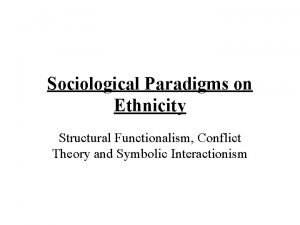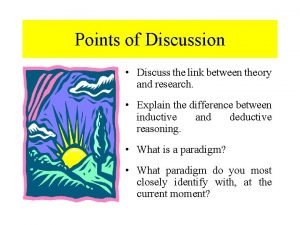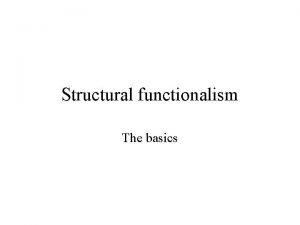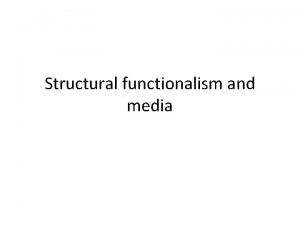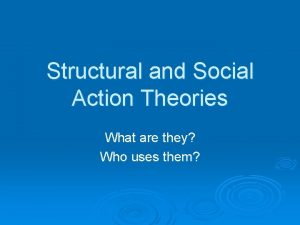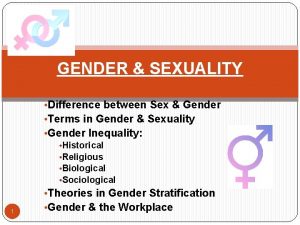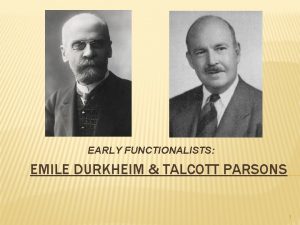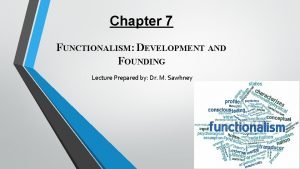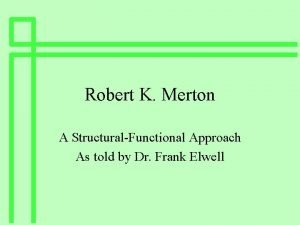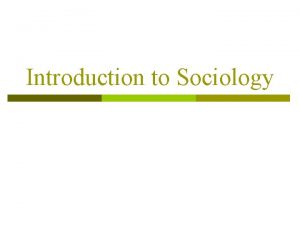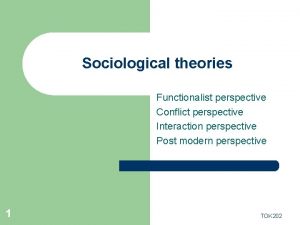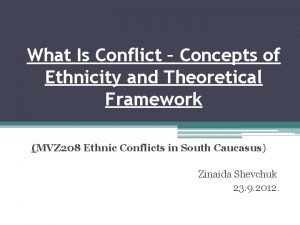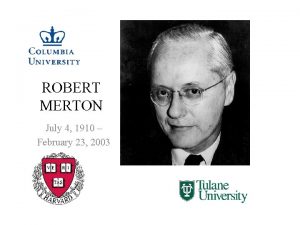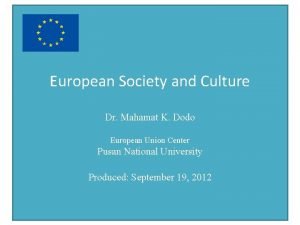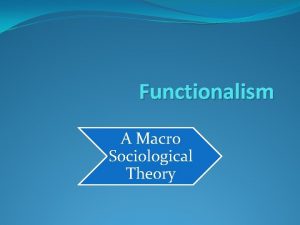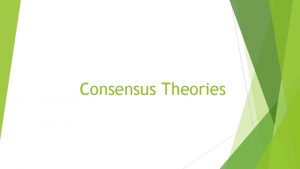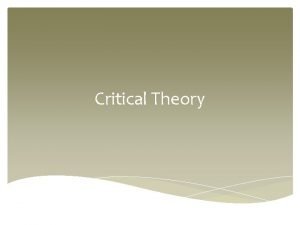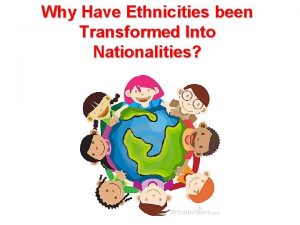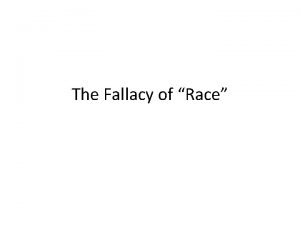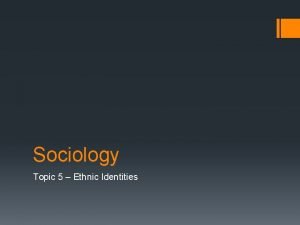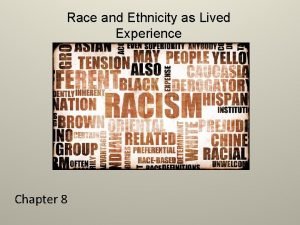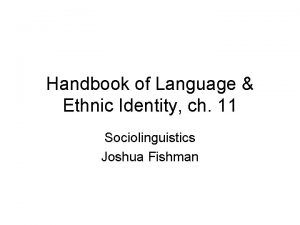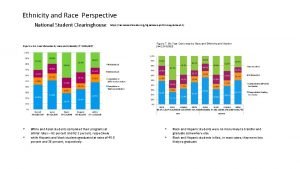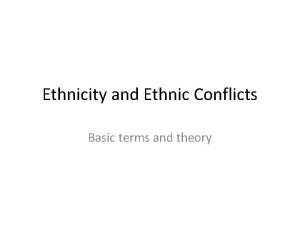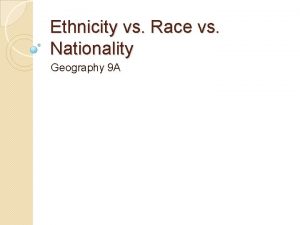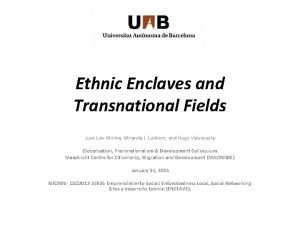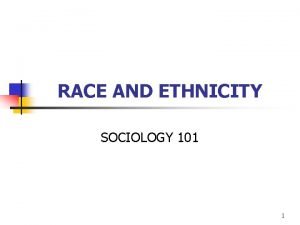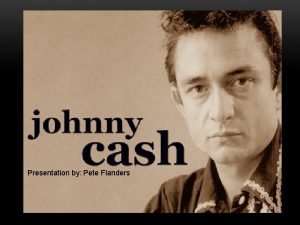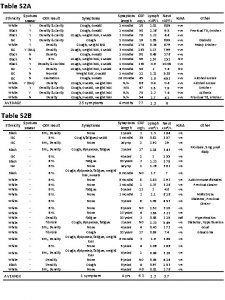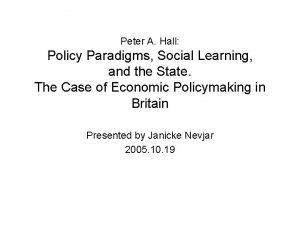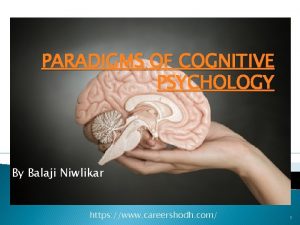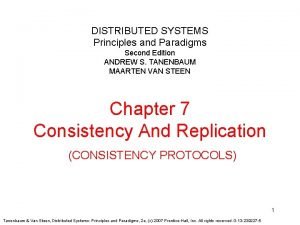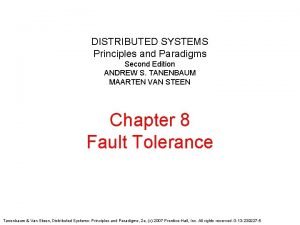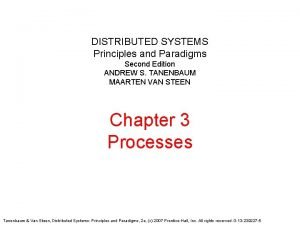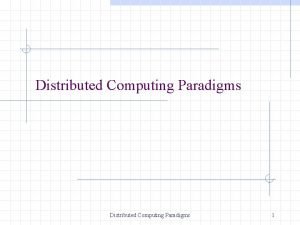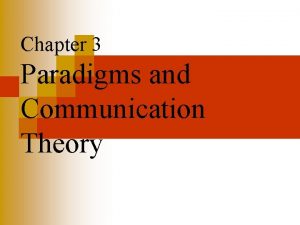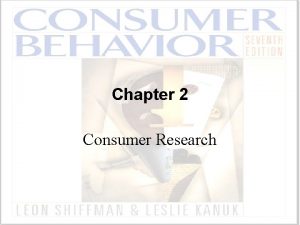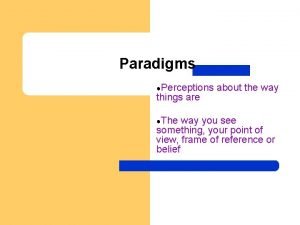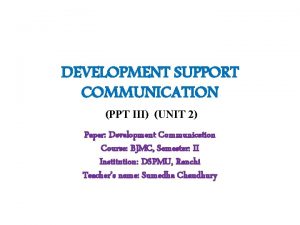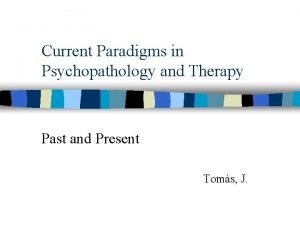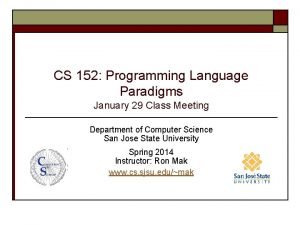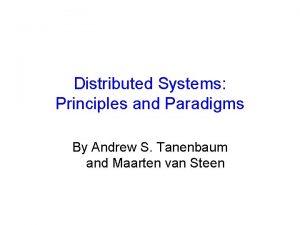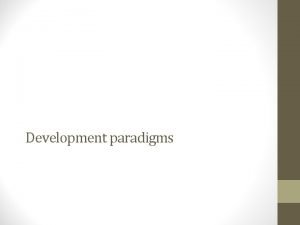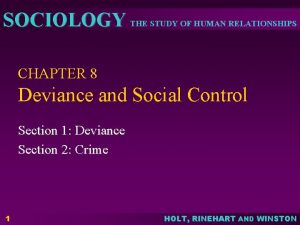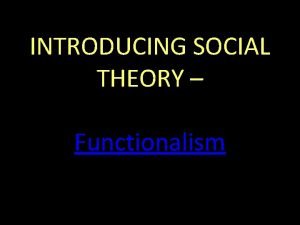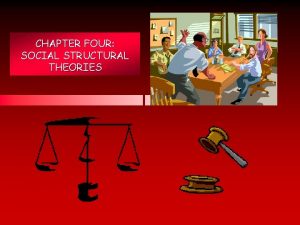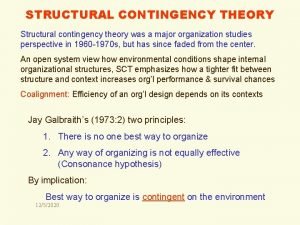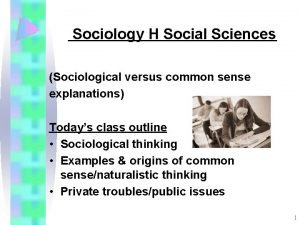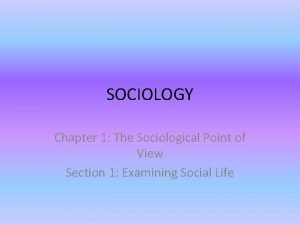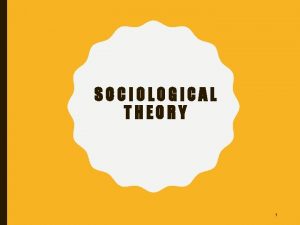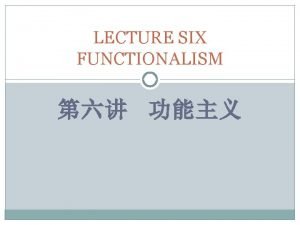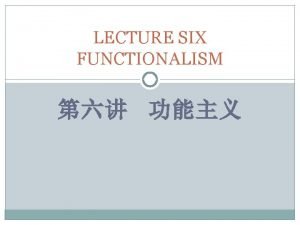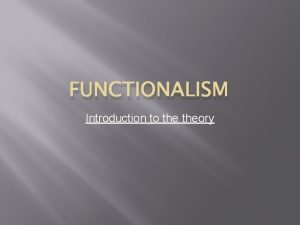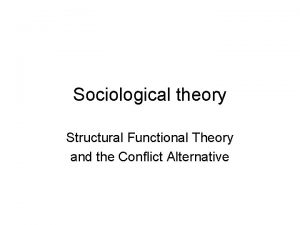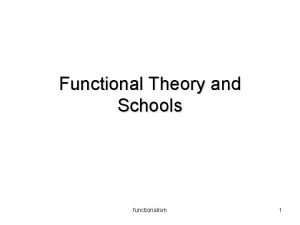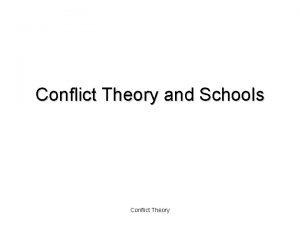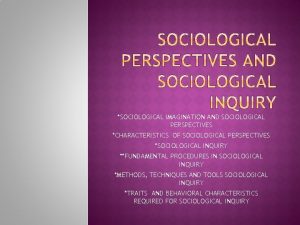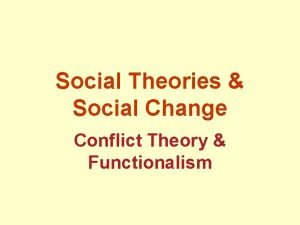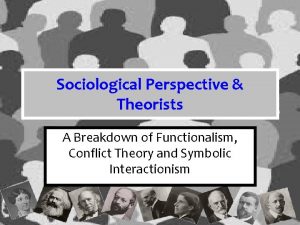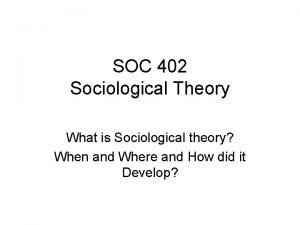Sociological Paradigms on Ethnicity Structural Functionalism Conflict Theory
















































![EPIPHENOMENON. • Definition: [noun] a secondary phenomenon that is a by-product of another phenomenon. EPIPHENOMENON. • Definition: [noun] a secondary phenomenon that is a by-product of another phenomenon.](https://slidetodoc.com/presentation_image_h/9ac55cfa02f4a452fd25bab35189f19e/image-49.jpg)








































- Slides: 89

Sociological Paradigms on Ethnicity Structural Functionalism, Conflict Theory and Symbolic Interactionism

Auguste Comte (1798– 1857) • Auguste Comte (coined the term sociology after he discovered that his preferred term, social physics, had already been used by a Belgian statistician.

Social Physics and Positivism • His philosophy is known as positivism, was to reach its apex in the most complete scientific discipline, his social physics. • Comte's positivistic science of social physics is commonly recognized to be the first systematized sociological theory.

What is a theory? • What is a theory? An explanation for a general class of phenomena. • In contrast to a theory, an approach, paradigm or perspective rarely spells out issues it merely suggests how the phenomenon can be looked at.

Classical Theorist/Theories • E. Durkheim-(American Sociology T. Parsons) • Karl Marx-(Frankfurt School A. Gramsci, G, Lucas, L, Altusser, ) • Max Weber (Chicago School- C. H. Cooley G. H. Mead).

• The Founding Fathers helped to generate the paradigms of sociological thought and inquiry

Sociology’s 5 paradigms • • • I. STRUCTURAL FUNCTIONALISM (Conservative, adaptive, equilibrium) 2. CONFLICT (Oppression, conflict, division) 3. SYMBOLIC INTERACTION (meaningful, negotiated interpreted)

Two newer paradigms 1. Feminism –Branches –liberal, Socialist/Marxist, Anti-Racist, Postmodernist 2. Post Modernism-M. Foucault • (chaos, pluralistic, fragmented, no grand narratives)

Paradigms • Paradigm -set of explicit and implicit assumptions that gives an idea meaning and direction.

• Grouped together under one paradigm are many theories that operate with the same world view • Other names for paradigms include: theoretical perspective and conceptual framework.

Characteristics of Paradigms • Paradigms are broader than theories; they contain a number of theories. • According to D. Cheal (1987) paradigms or approaches have five important uses:

5 uses of paradigms 1. Provide concepts to analyse data and communicate ideas.

• 2. They focus our thinking-direct our attention to certain phenomena rather than others.

• 3. They provide ways of answering questions by orienting assumptions.

• 4. They interpret what we observe.

• 5. They involve value judgements rooted in conservative or radical ideologies. L………………. . C…………………. R Radical Liberal Conservative

Major theories • Are categorized into paradigms • These paradigms or theoretical approaches are particularly important to sociology • Sociology a discipline that deals with Social Life - ideas and symbols not objects.

Paradigms Differ 1. On their view of human nature 2. On their view of social change 3. On view of how to study and observe human society

• Three Main Sociological Paradigms:

1. Structural Functionalism 1. Assumes that society is a stable, cooperative system. 2. Society is like an organism, (parts within the whole) 3. Societies are more or less structurally differentiated.

Structural-functionalism 5 characteristics 1. Structural-functionalism holds that society is ‘normative’ order 2. People’s behaviour is organized around social institutions comprised of rules and norms

3. Institutions are comprised of rules and norms, promote social integration 4. Functionalists tend to ask questions about the functional and dysfunctional elements of human behaviour and social institutions.

5. System Equilibrium • • • Functionalists emphasize: system equilibrium, normative consensus, . institutional symbiosis. Therefore, Functionalists such as T. Parsons (1955) believe that conflict is temporary and resolvable.

SF-Conservative paradigm • Societies tend to towards equilibrium, harmony, balance. • A conservative perspective `IS’ ORIENTATION • At the root of structural functionalism is the Hobbesian view of the state of nature.

Hobbesian • The structural functionalist is accepting of the Hobbesian view of man • It accepts that society is biologically based hierarchy as inevitable • The theory has its roots in Social Darwinism • Status differences are natural and functional.

Structural Functionalism • Structural Functionalism is a macro-level perspective • It views society as a system of interrelated parts • Society is integrated by (rules & norms=institutions) • The major parts of society are institutions • The institutions interelated and interdependent. (symbiosis)

SF- Socialization Paradigm Idealism • Ideas exist independent of social forces • Ideas about family, religion, politics derive from human reproduction • Ideas are produced inter-generationally

Agents of Socialization • Ideas are internalized through socialization • Agents of socialization-parents, peers, teachers, religious leaders, mass media are the voices of society. • Society does not speak with one voice but rather many voices-agents.

Criticisms of SF • Functionalism has been criticized as ahistorical, conservative and static 1. It fails to account for the historical processes that have produced social inequality (SF is ahistorical)

“The Way it is” 2. It accepts the system as it is… 3. Individual status difference- meritocracy and achievement are inevitable.

Functionalist APPROACH TO ETHNICITY 1. 2. 3. • The Primordialist Approach An `essentialist’ position Ethnicity is `ascribed “Primordial affinities and attachments” (Isaacs, 1975)

Primordial approach: Below are important • • • A group’s – Physical characteristics History and origin Language, religion and value system Geographical origin Economic and political history/conditions

SF on Ethnicity • Structural functionalists believe ethnicity generates social integration. 1. Ethnic identification is functional 2. Ethnicity provides belonging 3. Ethnicity guards against anomie and egoism

Sociologists adopting a functionalist approach • Observe how certain groups are held together through ethnic affiliation. • For example, Raymond Breton (1964) studies ethnic groups in terms of ‘Institutional Completeness’

1964 • Institutional Completeness of Ethnic Communities and the Personal Relations of Immigrants • by Raymond Breton U of Chicago Press

2. The Conflict Paradigm Conflict/Materialist Thesis. • Society is viewed a system of unequal parts engaged in a struggle for power. • Historically modes of production have been divided between haves and havenots

Conflict theory • At the root of Marx and other conflict theorist is the JJ. Rouseau’s view of man in a state of nature • “Human are born free but everywhere they in chains”. • Man is basically good and altruistic-he becomes corrupted however by society’s institutions-particularly economic.

Dialectical Materialism • Dominators and dominated- unequal groups • Examples: Household owner/slaves, aristocracy and peasantry, bourgeoisie and proletariat

Conflict. • Society is viewed a system of unequal parts engaged in a struggle for power. . • Groups are involved in a struggle which has an ultimate source -the owners of the means of production. • Their ethnic ideology is an `opiate’ directed towards other groups not the owners of the means of production.

CPR Example • Workers on the CPR did not unite into a proletarian revolution. • The Reason: Ethnic cleavages, ethnic suspicions… • Thus, the bourgeoisie-divide and conquer. .

The white Working Class • The white oppressed to turn to people of colour, jews native • Displaced aggression and develop fantastic ideologies rooted in the Bible and others. • It is a means of protecting private property.

White Oppression • The white working class has very little in common with the true owners of the means of production, • Yet they portray themselves as the colonizers over the colonized rather than an issue between the rich and poor. • They buy into the ideology of the bourgeoisie.

Ideologies of Bourgeoisie • Disseminated upon all groups in capitalist society • An ideologies of achievement, • The system is fair and the State is neutral. • “Any man can become President” …”The Cream rises to the top” • Competition is healthy-‘survival of the fittest’

Historical Materialism • TRIBAL • ANCIENT COMMUNAL • FUEDAL • CAPITALISM======false consciousness • Socialism or `true’ communism

Key Notions • History is dialectical, staged and conflicted • Dialectical-each mode of production sows the seeds of its own destruction • All modes above have been beyond human control -forces of production • Socialism-the first mode of production in the interests of all • .

The conflict perspective • The conflict perspective holds that each prevailing system is maintained by an ideology used to justify inequality. • See Oscar Lewis’ “culture of poverty” –a blame the victim thesis. . • Conflict theorists-argue that should blame the system. .

• The ideas of any epoch (mode of production) are the ideas of the ruling class. ” • These ideas maintain group hegemony

Epiphenomenon • Derived from Marxism • Ethnicity is one aspect of exploitation of labour by the capitalist class. • Ethnicity and race issues are a bi-products of class relations and class conflict.
![EPIPHENOMENON Definition noun a secondary phenomenon that is a byproduct of another phenomenon EPIPHENOMENON. • Definition: [noun] a secondary phenomenon that is a by-product of another phenomenon.](https://slidetodoc.com/presentation_image_h/9ac55cfa02f4a452fd25bab35189f19e/image-49.jpg)
EPIPHENOMENON. • Definition: [noun] a secondary phenomenon that is a by-product of another phenomenon. Synonyms: Search for synonyms for. .

EPIPHENOMENON. • A secondary phenomenon that results from and accompanies another: "Exploitation of one social class or ethnic group by another [is] an epiphenomenon of real differences in power between social groups" (Harper's)

Internal colonialism • . The term is used to describe the uneven effects of economic development on a regional basis, • otherwise known as "uneven development", • IC describes the exploitation of minority groups within a wider society. • This is held to be similar to the relationship between metropole and colony, in colonialism proper.

Example of Internal Colonialism • Internal Colonialism (Hechter, 1978) • Boynetown • Peripheral labour-agriculture, community and ethnicity. • Groups create solidarity detached from the center of political economy. • See Peter S. Li, Ethnicity in a Class Society

CRITICISMS of Conflict Theory • The only problem weakness in the conflict approach is that it’s deterministic and reductionist, • Society is viewed in terms of conspiracy • Fails to account for individual values and beliefs • Lower classes support the system with their own ideas- this is not ideology

3. Symbolic Interactionism: the interpretive approach • Symbolic interactionism portrays the social world as constructed, negotiated and meaningful. • Sociologist use techniques such as participant observation to interpret members points of view • The approach focused on micro-sociological level of intersubjective experiences.

Social constructionism • A symbolic interactionist looks at the processes by which intra-group and intergroup relations are defined and constructed through on-going activities • Societal is social constructed and meaningful.

Symbolic Interaction Key ideas 1. Interpersonal relations and process construct an on-going reality 2. Macro-levels are constructed by microlevel processes 3. Social reality is fluid and negotiated in the moments 4. Reality is constructed, interpreted constructed, assessed by its members (situational)

SI Methods • Symbolic interactionism adopts qualitative methods • Symbolic interactionist study the world from `the bottom up’ • Their approach is inductive as opposed to deductive • SI –an Interpretative approach- a perspective of details, situations-.

WEBER • THE PROTESTANT ETHIC AND THE SPIRIT OF CAPITALISM…(1904) • • Debating with the ghost of Karl Marx? Or filling in Marx materialist conception? Weber is not a radical -liberal Weber a social democratic thinker (left of center)

Max Weber • Weber argues that capitalism has its own spirit or ethos • Individual rationality -time is money, rational bookeeping, saving, investment are individual choices • Capitalism Not solely determined by ideology • –people `value’ capitalism.

Status vs. Class • Social class is Marx’s description of objective relations to the mode of production • To Weber, status groups underlie social classes… • Status determined badges of honor and preference. See Mc. Cauley “Nativism and Social Closure” IJCS (1990)

Spirit of capitalism • The source of the ethic derives initially from THE PROTESTANT ETHIC • Specifically, Calvinism • Calvinism generated notions of predestination and The Calling… • Found its way into 19 th attitudes and beliefs. • For example, Ben Franklin embodies The SPIRIT OF CAPITALISM

Weber and Symbolic Interactionism • Max Weber’s work helped in the development of the Symbolic Interactionist paradigm. • Micro Sociology-developed and enhanced by The Chicago School of Sociology • Founders-G. H. Mead, C. H. Cooley and Robert Park.

Symbolic interactionist • A symbolic interactionist looks at the process by which intra-group and intergroup relations. . • Inter-group relations are defined and constructed through on-going activities.

For example, • In their social world a KKK member, Neo Nazi, Arian Nation have a choice. • They may either adopt inclusion or exclusion. • They choose Social Closure and exclusion.

Social constructionism • A symbolic interactionist looks at the processes by which intra-group and intergroup relations are defined and constructed through on-going activities • Societal is social constructed and meaningful.

Social Closure (Weber, 1926) • These groups believe their interest are like the bourgeoisie…Christianity, Anglo. Saxonism. • They use closure to restrict access to resources and power

Internal colonialism • - the dominant group (bourgeosie) imposes its social, political and cultural institutions upon others (both black and white proletariat) who the compete against each other. •

Symbolic Interaction • Ethnic association is about `membership’ and political advantage • Ethnicity `re-emerges as a strategic choice in a competitive environment • Ethnicity is about `power, status and privilege’

Ethnicity • Is social psychological-an interpretive process • Us and Them • Ethnicity is purely symbolic • Ethnicity is negotiated and constructed

Subjectivist Studies • Bennet (1975) ethnicity is something new in the world…. people of seize their own cultural symbols as a definition of their own identity. • Isajiw-the persistence of ethnicity depends not on maintenance of identity (1 gen) • Rather new forms constructed (ie third gen)

Summary Paradigms 1. Structural Functional –primordial 2. Conflict- Epiphenomenon 3. Situational-symbolic Interaction • n

Three perspectives: • Functionalists-assume a stable cooperative social system. During times of stress and rapid social change, elements of the system unravel. • Countervailing forces are activated by selfrighting mechanisms to provide resolution of problems and management of contradiction.

Symbolic Interactionists • Symbolic interactionism portrays the social world as constructed, negotiated and meaningful. • The approach focuses on microsociological level of intersubjective experiences.

Symbolic interactionist • A symbolic interactionist looks at the process by which intra-group and intergroup relations are defined and constructed through on-going activities. In their social world a KKK member, Neo Nazi, Arian Nation has a choice. They may either adopt inclusion or exclusion. •

Biology as Ideology Functionalism and Conflict Theory

Biological determinism • Biological determinism, also called genetic determinism, is the hypothesis that biological factors such as an organism's individual genes (as opposed to social or environmental factors) completely determine how a system behaves or changes over time.

Appeals to Nature • The naturalistic explanation for why the world is the way it is goes as follows: we differ in our innate capacities. • Biological determinists believe that society derives from innate characteristics transferred from generation to generation.

Functionalism-an ‘is’ perspective • Functionalism- accepts genetic differences between genders, races, and classes as natural & inevitable. • Ie. Sociobiology & Psychoanalytic Theory • Structural Functionalism • THAT’S the Way it Is!!! • All of the above make appeals to nature

The Biology is Destiny Argument • The biological determinist argument makes four points as follows: • 1. The differences between us is derived from our genes • 2. These differences in ability are converted into differences in status

Four points cont. . • 3. Society, then is naturally hierarchicalsocial inequality is inevitable • 4. Social equality- a society of equal reward and status is biologically impossible. See Davis and Moore on “Stratification” (1945)

Society is a beehive • Kinsley Davis and Wilbert Moore • Functional Theory of Stratification "Some Principles of Stratification" (1945) • Equality is impossible-individuals are naturally stratified.

Social Darwinism • The idea that blood will tell was not invented by biologist per se, but by nineteenth century Social Darwinists…and popular literature such as Oliver Twist …The artful dodger is a “snubbed nosed, flat browed, common faced boy…etc…

Early psychology (Baldwin) • Sociobiology • An early branch of Psychology made wild claims about human physical characteristics and behaviours: • Shifty eyes = criminal • red hair =violence • black men with darker skin are more animalistic

Early Psychology • Not only were differences restricted to innate individual differences • Nations and Racial groups were subjected to the same treatment: • Ie. Carl Brigham -IQ Tests “the decline of the American intelligence will be more rapid…owing to the presence here of the Negro”

th 19 century thought • 19 th c. Psychologist Louis Agassiz-argued that the skulls of Negro babies close earlier, so their brains were entrapped • Osburne, President of the American Museum of Natural history argued that the northern races invaded the southern so as to “contribute strong and moral elements to a more or less decadent civilization….

Conflict/Materialist Approach • Biology is at the foundation of gender construction. • However it is culture that has promoted gender inequality. • This was the position of Fredrick Engels in his famous essay “Origins of Family, Private Property and the State” (Tucker, 1971)

Conflict Theory (from is to ought) • Patriarchy, he argued emerged out of the development private property…. • Man’s ownership of land other resources led to a belief that female sexuality had to be controlled. . • For Engels patriarchy is not inevitable, this is the thinking of those who fail to look at history…. and material construction of society

Historical Materialism and hierarchy • Marx’s historical materialism sought to demonstrate how systems are dialectically linked…. . and capitalism is not inevitable. • Capitalism is only one historical mode of production.

MARX AND ENGELS • TO THESE CONFLICT THEORISTS: • Differences in wealth, status and power between classes, ethnic groups and genders ARE not natural. • They are socially constructed by owners of the means of production
 Functionalism sociology
Functionalism sociology Sociological imagination vs sociological perspective
Sociological imagination vs sociological perspective Structural functionalism theory
Structural functionalism theory Functionalism strengths
Functionalism strengths Advantages of functionalism
Advantages of functionalism Structural functionalism and social media
Structural functionalism and social media Social action theory examples
Social action theory examples The difference between sex and gender
The difference between sex and gender What is talcott parsons structural functionalism
What is talcott parsons structural functionalism Structural functionalism founder
Structural functionalism founder Robert k merton dysfunction theory
Robert k merton dysfunction theory What is structural functionalism
What is structural functionalism Structural functionalism examples
Structural functionalism examples Conflict sociological perspective
Conflict sociological perspective What is ethnicity
What is ethnicity Sociological theory of crime
Sociological theory of crime Sociological theory of corporate governance
Sociological theory of corporate governance Sociological theory
Sociological theory Neo functionalism theory
Neo functionalism theory Neofunctionalism
Neofunctionalism Functionalism
Functionalism Consensus theory: functionalism
Consensus theory: functionalism Critical theory conflict theory
Critical theory conflict theory Structural conflict
Structural conflict Structural conflicts
Structural conflicts Structural conflict
Structural conflict Structural conflict
Structural conflict Countries and nationalities
Countries and nationalities Troian bellisario ethnicity
Troian bellisario ethnicity What is ethnicity
What is ethnicity Symbolic ethnicity
Symbolic ethnicity Chapter 8: race and ethnicity as lived experience
Chapter 8: race and ethnicity as lived experience Ethnicity in sociolinguistics
Ethnicity in sociolinguistics Lactose intolerance by country
Lactose intolerance by country Nationality definition ap human geography
Nationality definition ap human geography Ethnicity examples
Ethnicity examples What is ethnicity
What is ethnicity Ethnicity in postcolonial literature
Ethnicity in postcolonial literature Multiethnic state definition
Multiethnic state definition Baltic ethnicity
Baltic ethnicity What blood type is taylor swift
What blood type is taylor swift Porter novelli healthstyles survey
Porter novelli healthstyles survey Race vs ethnicity vs nationality
Race vs ethnicity vs nationality Rh alleles
Rh alleles Bitwit ethnicity
Bitwit ethnicity Is hispanic an ethnicity
Is hispanic an ethnicity Servingness
Servingness Luis molina ethnicity
Luis molina ethnicity Tower hamlets ethnicity
Tower hamlets ethnicity Shatterbelt definition ap human geography
Shatterbelt definition ap human geography Define race and ethnicity
Define race and ethnicity Vivian liberto
Vivian liberto Medium sized nose
Medium sized nose Gordon lightfoot ethnicity
Gordon lightfoot ethnicity Isc ethnicity
Isc ethnicity Hall policy paradigms
Hall policy paradigms Balaji psychology
Balaji psychology Paradigm and principles
Paradigm and principles Syntagms and paradigms
Syntagms and paradigms Paradigms of interaction
Paradigms of interaction Distributed systems principles and paradigms
Distributed systems principles and paradigms Message ordering paradigms
Message ordering paradigms Distributed systems principles and paradigms
Distributed systems principles and paradigms Computing paradigms
Computing paradigms 3 paradigms
3 paradigms Consumer research paradigms
Consumer research paradigms Paradigms of others examples
Paradigms of others examples Binding in programming paradigms
Binding in programming paradigms Ktu programming paradigms notes
Ktu programming paradigms notes Paradigms of development communication ppt
Paradigms of development communication ppt Designer released now multimedia authoring system
Designer released now multimedia authoring system Decide evaluation framework
Decide evaluation framework Current paradigms in psychopathology
Current paradigms in psychopathology R programming language paradigms
R programming language paradigms Features of php programming language
Features of php programming language Paradigms and principles
Paradigms and principles Distributed systems principles and paradigms
Distributed systems principles and paradigms Paradigms of development
Paradigms of development Distributed systems principles and paradigms
Distributed systems principles and paradigms Whats an external conflict
Whats an external conflict What is conflict and conflict resolution?
What is conflict and conflict resolution? External conflict definition
External conflict definition Structural strain theory sociology
Structural strain theory sociology Structural theory sociology
Structural theory sociology Structural strain theory sociology
Structural strain theory sociology Structural contingency
Structural contingency The sociological perspective stresses
The sociological perspective stresses Examples of common sense and sociological explanations
Examples of common sense and sociological explanations By adopting a sociological imagination
By adopting a sociological imagination Sociological theories
Sociological theories
